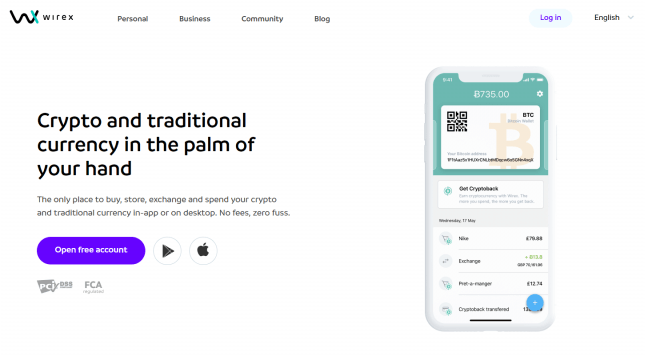Lack of regulation and more specifically approval from leading economies’ official regulatory bodies has been somewhat of a thorn in the side of the burgeoning cryptocurrency industry.
Since cryptocurrencies operate in a self-regulating, decentralised environment, many consumers have felt unsure about how to assess their value and legitimacy. They also get confused about the actual nature of the businesses on offer.
This problem led co-founders Pavel Matveev and Dmitry Lazarichev of Wirex Limited, one of the space’s leading digital money payments platform, to apply for a UK FCA (Financial Conduct Authority) e-money licence. The licence, which was granted on August 20th this year (No: 902025), is a significant milestone for both Wirex and the industry as a whole. Lazarichev explained what the licence means for the consumer:
The licence will provide consumers with peace of mind, knowing that their money is being handled in accordance with the Financial Conduct Authority’s (FCA’s) rigorous requirements. The licence demonstrates that our services have all the necessary safeguards in place, and that crypto–friendly companies are gradually becoming more mainstream.
The FCA, the UK’s independent financial body, regulates about 56,000 financial services firms, with a stated strategic objective of ensuring that the relevant markets work efficiently and with integrity. They aim to take a three-pronged approach: protecting consumers, strengthening the integrity of the UK financial system, and promoting competition in the interests of consumers. This approach, the founders believe, is very much in-line with the company’s ethos:
“We support this approach, because while there are strong measures in place to protect consumers, the FCA doesn’t strangle innovation” says Matveev, explaining that Wirex is a payment platform that allows users to store, buy, sell and transfer both crypto and fiat currencies, and exchange easily between the two.
With a track-record of over four years, the company serves 1.7 million customers in 130 countries, who have collectively made more than $1.5 billion in transactions. The licence application was intended to improve and refine its e-money services throughout the European Economic Area (EEA), while simultaneously increasing efficiency and lowering costs for its customers.
Matthew Owen, General Counsel for Wirex Limited, says the application process, which combines online submissions with close engagement with a designated FCA supervisor required:
- A detailed business plan outlining Wirex’s e-money business;
- Details of Wirex’s governance arrangements, structure and internal procedures and control mechanisms, including those for risk monitoring and reporting;
- Provision and discussion of a range of governance, risk, business continuity, disaster recovery, IT security and reporting policies;
- Information on the measures Wirex has taken to safeguard e-money holders’ funds;
- Evidence demonstrating sufficient capital to provide e-money services;
- Biographies and information on the people responsible for Wirex’s e-money and payment services businesses (i.e. owners, board and senior management); and
- details qualifying shareholdings representing 10% or more of the capital or voting rights in Wirex’s business (to ensure interests are fully disclosed and transparent to the FCA).
A Significant Endorsement
The process typically takes between four and eight months from the date the application is submitted, he explained, but there is also extensive preparation required beforehand to ensure all the necessary documentation is ready at the time of application. Owen explained:
It’s important to note that the FCA does not regulate cryptocurrencies, The fact that Wirex offers fiat currency exchange services in tandem with crypto, necessitates an FCA e-money licence.
The FCA’s approach to cryptocurrencies will be encouraging, particularly at a time when regulatory bodies have been somewhat ambivalent to the crypto-economy – with the US SEC yesterday rejecting nine bitcoin ETF (Exchange Trade Fund) applications.
The FCA in contrast, has adopted a cautious but progressive stance towards blockchain technology, and Wirex’s admission as an FCA-regulated platform attests to this.
The FCA licence does not expire. However, Owen explains that a licensing fee is payable annually to maintain Wirex’s authorisation and the FCA does conduct periodic (usually annual) audits to ensure systems and processes remain compliant.
Some of the measures the company has taken to safeguard e-money holders’ funds include:
- PCI-DSS Level 1 certification – the highest standard within the payments industry;
- 3-D Secure enrolment, to protect all online transactions from unauthenticated payments and fraud
- Accounts are secured with two-factor authentication; and
- Cold-multi-signature storage makes funds less vulnerable to hacking.
Wirex aims to seek equivalent licences and other complementary ones, in all territories where the company operates, and intends to expand its operations and services to customers to increase the value it provides.
The licence is testament to Wirex’s commitment to pursuing and achieving the highest levels of diligence and integrity in its business operations” says Lazarichev. “Since the FCA’s role is to protect consumers, maintain the stability of the financial services industry and promote healthy competition between financial services providers, Wirex’s submission to the FCA’s jurisdiction should leave customers in no doubt that we will provide them with a best-in-class platform and accompanying service.









